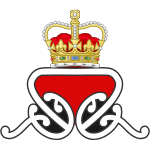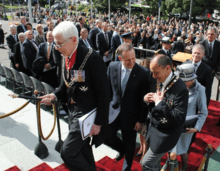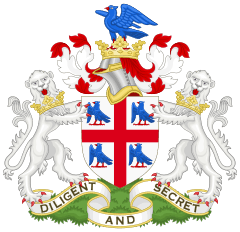New Zealand Herald Extraordinary
New Zealand Herald of Arms Extraordinary is the officer of arms responsible for the regulation of heraldry in New Zealand. Although affiliated with the College of Arms in London, the New Zealand Herald lives and works in New Zealand, and is not a member of the College Chapter. The current New Zealand Herald of Arms Extraordinary is Phillip Patrick O’Shea.
 The heraldic badge of New Zealand Herald of Arms Extraordinary | |
| Heraldic tradition | Gallo-British |
|---|---|
| Jurisdiction | New Zealand |
| Governing body | College of Arms |
Historical background
Consideration was given in 1975 to establishing an independent heraldic authority in New Zealand. In particular there were proposals for a new provincial king of arms, titled New Zealand King of Arms, to be under the Earl Marshal and Garter Principal King of Arms. This would have been an officer of arms in ordinary and a part of the corporation of the College of Arms. It was decided however to continue to use the College of Arms.
On 6 February 1978, Phillip Patrick O'Shea was appointed as the first New Zealand Herald of Arms Extraordinary to Her Majesty The Queen. The appointment was made by royal warrant of the Queen of New Zealand addressed to the Earl Marshal of England. Having been accomplished in this way, New Zealand Herald's appointment was unlike other extraordinary heralds and more akin to that of officers of arms in ordinary. The warrant of appointment has not been published in the New Zealand Gazette.
Heraldic duties
Unlike some other Commonwealth countries with their own local heraldic authorities, armorial ensigns in New Zealand continue to be granted by the Kings of Arms of the College of Arms in London. New Zealand Herald of Arms Extraordinary has no autonomous power to grant arms. However, New Zealand Herald of Arms Extraordinary advises the New Zealand Government on heraldic matters, represents the College of Arms in New Zealand, is deputy in that country to Garter Principal King of Arms, and is ex officio a member of the Royal Household. The current New Zealand Herald Extraordinary was also appointed the Herald of the New Zealand Order of Merit on its institution in 1996.[1]
Since the creation of the office of New Zealand Herald of Arms Extraordinary in 1978, letters patent issued through by the College of Arms to New Zealanders have de-emphasised their English character. Thus, the Earl Marshal is simply noted as "Earl Marshal" rather than "Earl Marshal and Hereditary Marshal of England". In the same way, the Queen's New Zealand royal style has been used rather than that of the United Kingdom.
The appointment of New Zealand Herald of Arms Extraordinary does not affect the jurisdiction of the Lord Lyon, King of Arms to grant coats of arms to citizens of New Zealand of Scottish descent or, to matriculate a coat of arms in favour of a New Zealander petitioner where they have a right of succession to those arms or a differenced version of that coat of arms. [2]
Ceremonial duties

The New Zealand Herald of Arms Extraordinary attends the Governor-General (or the Sovereign, if present) on ceremonial occasions which include the swearing-in of a new Governor-General, investitures of Royal honours, and the ceremonial Opening of Parliament.[1] Since at least 2002 the New Zealand Herald of Arms Extraordinary has been the person appointed by the Governor-General to proclaim the dissolution of Parliament.[3][4][5][6]
When performing duties the New Zealand Herald of Arms Extraordinary wears morning dress together with the chains of office and holding a herald's baton. The tabard of the Royal Arms are only worn at ceremonial occasions when in England together with the other heralds; the most recent occasion being at the Thames Diamond Jubilee Pageant in 2012.
Badge of office
The badge of office of New Zealand Herald of Arms Extraordinary is blazoned A complex Māori Koru coloured in the traditional manner proper ensigned by a representation of the Royal Crown also proper. The Koru design is used to decorate the rafters of Māori meeting houses, where important ceremonies take place, and it is also found on a number of objects at these ceremonial gatherings. The loops and coils of the Koru also represent the complex Māori genealogical tree of the Whakapapa. Māori genealogy is based for the most part on oral evidence and tradition, and in art the Koru is used to represent this.
Holders of the office
| Arms | Name | Dates of office | Notes | Ref. |
|---|---|---|---|---|
 |
Phillippe (Phillip) Patrick O’Shea CNZM CVO | 6 February 1978–Present | Born 23 March 1947 in Wellington. He was educated at St. Patrick's College, Wellington and Victoria University of Wellington. He was Librarian and numismatic advisor to Treasury from 1967–74, Advisory Officer (Honours) to the Department of Prime Minister and Cabinet from 1974, and New Zealand Herald of Arms Extraordinary to the Queen from 1978. In the 2014 New Year Honours O'Shea was appointed a Commander of The Royal Victorian Order. | [7][8][9] |
References
- Citations
- Department of the Prime Minister and Cabinet. "New Zealand Herald of Arms Extraordinary". Retrieved 22 May 2012.
- Stair Memorial Encyclopaedia of The Laws of Scotland, Vol. 6 paragraph 1017 "Administrative and ministerial functions of the Lord Lyon" and Vol. 11 paragraphs 1615 "Grants of Arms" and 1617 "Matriculations".
- Proclamation Dissolving the Parliament of New Zealand (19 June 2002) 66 New Zealand Gazette 1741.
- Proclamation Dissolving the Parliament of New Zealand (12 August 2005) 124 New Zealand Gazette 3031.
- Proclamation Dissolving the Parliament of New Zealand (6 October 2008) 153 New Zealand Gazette 4049.
- Proclamation Dissolving the Parliament of New Zealand (21 October 2011) 160 ’’New Zealand Gazette 4575.
- "No. 60728". The London Gazette (4th supplement). 31 December 2013. p. 4.
- “The Royal Victorian Order” (10 April 2014) 38 New Zealand Gazette 1076 at 1092.
- "The Queen's Birthday Honours List 2005". Department of the Prime Minister and Cabinet (of New Zealand). 6 June 2005. Retrieved 11 July 2013.
- Bibliography
- Squibb, George, "Heraldic Authority in the British Commonwealth" (1968) Coat of Arms vol 10 no 76 p 125
- O'Shea, P.P., "The Office of the New Zealand Herald of Arms" (1982) 20 New Zealand Armorist 7
- Macaulay, G.A., "Honours and Arms: Legal and Constitutional Aspects of Practice concerning Heraldry and Royal Honours in New Zealand" (1994) 5 Canterbury Law Review 381
- Innes, Sir Malcolm, of Edingight, "New Zealand Herald of Arms Extraordinary" (1979) 3 Commonwealth Heraldry Bulletin
- Innes, Sir Malcolm, of Edingight, "New Zealand Herald of Arms Extraordinary" (1979) 13 Heraldry in Canada 34
- Sir Crispin Agnew of Lochnaw, "The Conflict of heraldic laws" (1988) Juridical Review 61
- Cox, Noel, "The Law of Arms in New Zealand" (1998) 18 (2) New Zealand Universities Law Review 1
- Cox, Noel, "The Law of Arms in New Zealand" (2002) 29 Heraldry News, the Journal of Heraldry Australia Inc. 13
- Lambert, Max, "Who’s Who in New Zealand" (1991, Reed, Wellington, 12th edn) ISBN 0-7900-0130-6
